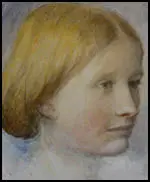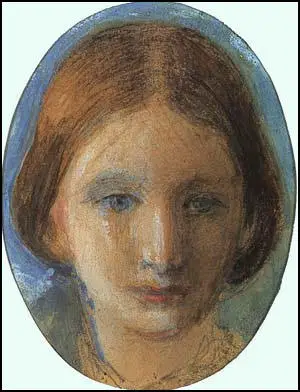Rose La Touche

Rose La Touche, the daughter of John La Touche, a wealthy Irish banker, was born in 1848. Her father became a friend of the art critic, John Ruskin. In his autobiography, Præterita: Outlines of Scenes and Thoughts Perhaps Worthy of Memory in My Past Life (1885), he wrote about his first meeting with Rose: "On presently the drawing room door opened, and Rosie came in, quietly taking stock of me with her blue eyes as she walked across the room; gave me her hand, as a good dog gives its paw, and then stood a little back. Nine years old, on 3rd January, 1858, thus now rising towards ten; neither tall nor short for her age; a little stiff in her way of standing. The eyes rather deep blue at that time, and fuller and softer than afterwards. Lips perfectly lovely in profile; - a little too wide, and hard in edge, seen in front; the rest of the features what a fair, well-bred Irish girl's usually are; the hair, perhaps, more graceful in short curl around the forehead, and softer than one sees often, in the close-bound tresses above the neck." Ruskin he gave drawing lessons. John Ruskin wrote letters to Rose and he kept her replies "wrapped in gold leaf, tucked inside his waistcoat, close to his heart."
According to Ruskin's biographer, Robert Hewison: "By the autumn of 1861 Ruskin felt deeply drawn towards Rose, but that October she fell ill for the first time from the psychosomatic disorder (possibly the as yet unrecognized condition anorexia nervosa)... Ruskin's preference for daughter over mother may have caused some tension... He did not see Rose between the spring of 1862 and December 1865, though Mrs La Touche did not break off contact. Rose had further bouts of illness in 1862 and 1863. Like other men of his class and culture... Ruskin enjoyed the company of young girls... It was their purity that attracted him; any sexual feelings were sublimated in the playful relationship of master and pupil that characterized his letters to several female correspondents."
In January, 1866, John Ruskin, aged forty-six, proposed marriage to nineteen year old, Rose. She did not reject Ruskin but asked him to wait for three years. John La Touche and his wife were opposed to the marriage and Ruskin was only able to communicate with Rosa by using intermediaries, such as George MacDonald, Georgiana Cowper and Joan Agnew.
On 7th January, 1870, Ruskin met Rose accidentally at the Royal Academy. Rose, who was now 23 years old, began to see Ruskin on a regular basis. John and Maria La Touche became increasingly concerned about the possibility that her daughter might marry Ruskin. In October, 1870, Marie wrote to Effie Millais, Ruskin's former wife, seeking evidence of Ruskin's impotence in order to stop the marriage. Effie confirmed this and stated that Ruskin was "utterly incapable of making a woman happy". She added that "he is quite unnatural... and his conduct to me was impure in the highest degree." She ended her letter by saying, "My nervous system was so shaken that I never will recover, but I hope your daughter will be saved."
John Everett Millais became concerned about the impact that this correspondence was having on his wife. He wrote to Rose's parents begging them to leave his wife alone. He insisted that "the facts are known to the world, solemnly sworn in God's house" and asked why this "indelicate enquiry necessary". Millais then went on to argue that Ruskin's "conduct was simply infamous, and to this day my wife suffers from the suppressed misery she endured with him." Millais feared that a consummated marriage with Rose would render the previous grounds for annulment void, and would make his marriage to Effie bigamous.

In July 1871 Rose broke off her relationship with John Ruskin. Shocked by the news, he suffered a mental breakdown while staying Matlock Bath in Derbyshire. Rosa's health was also deteriorating. In an effort to help her recover, they gave permission for Ruskin to visit her at their estate in Harristown, County Kildare. In January 1875, she returned to London, but extremely ill, and Ruskin saw her for the last time on 15 February, before she was taken to Dublin in April.
Rose La Touche died on 25th May, 1875, aged twenty-seven. Suzanne Fagence Cooper, the author of The Passionate Lives of Effie Gray, Ruskin and Millais (2012), has pointed out that "she died of anorexia, or brain fever, or a broken heart, depending on which account you believe". Ruskin later wrote: "Rose, in heart, was with me always, and all I did was for her sake."
Primary Sources
(1) John Ruskin, Præterita: Outlines of Scenes and Thoughts Perhaps Worthy of Memory in My Past Life (1885)
On presently the drawing room door opened, and Rosie came in, quietly taking stock of me with her blue eyes as she walked across the room; gave me her hand, as a good dog gives its paw, and then stood a little back. Nine years old, on 3rd January, 1858, thus now rising towards ten; neither tall nor short for her age; a little stiff in her way of standing. The eyes rather deep blue at that time, and fuller and softer than afterwards. Lips perfectly lovely in profile;--a little too wide, and hard in edge, seen in front; the rest of the features what a fair, well-bred Irish girl's usually are; the hair, perhaps, more graceful in short curl around the forehead, and softer than one sees often, in the close-bound tresses above the neck.
